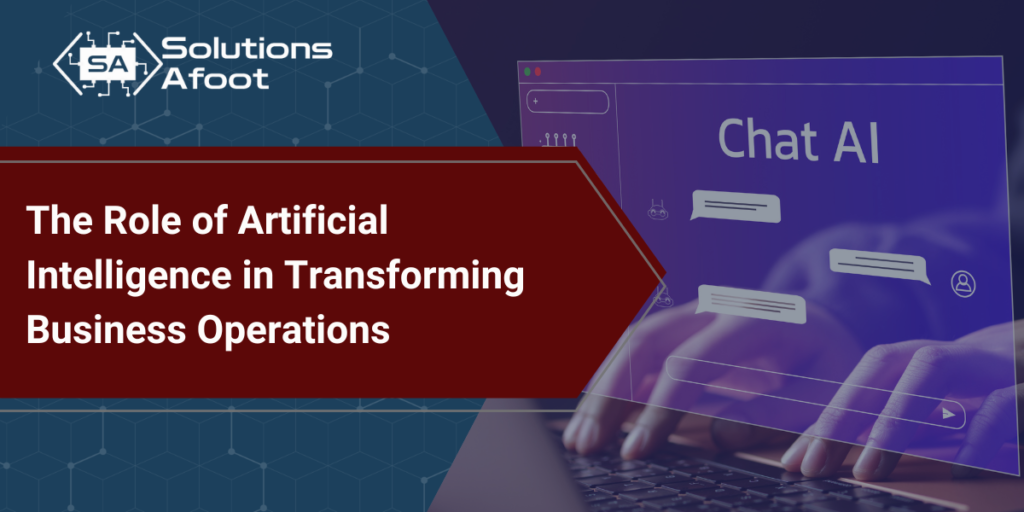The Role of Artificial Intelligence in Transforming Business Operations

The Role of Artificial Intelligence in Transforming Business Operations
Artificial Intelligence (AI) is no longer just a buzzword; it is a transformative force that is reshaping the way businesses operate. From automating routine tasks to providing deep insights through data analysis, AI offers numerous opportunities for enhancing efficiency and driving innovation. In this article, we’ll explore the role of AI in transforming business operations and highlight practical applications that can benefit various industries.
The Rise of AI in Business
AI has made significant strides in recent years, thanks to advancements in machine learning, natural language processing, and data analytics. These technologies enable AI systems to learn from data, recognize patterns, and make decisions with minimal human intervention. Businesses across industries are leveraging AI to streamline operations, reduce costs, and gain a competitive edge.
Key Applications of AI in Business Operations
Automating Routine Tasks: One of the most significant benefits of AI is its ability to automate repetitive and mundane tasks. AI-powered automation tools can handle tasks such as data entry, scheduling, and customer service inquiries. This automation frees up employees to focus on more strategic and creative activities, leading to increased productivity and job satisfaction.
Enhancing Customer Service: AI-driven chatbots and virtual assistants are revolutionizing customer service by providing instant and accurate responses to customer queries. These tools use natural language processing to understand and respond to customer needs, offering 24/7 support and reducing wait times. AI can also analyze customer interactions to identify common issues and improve service quality.
Optimizing Supply Chain Management: AI can enhance supply chain efficiency by predicting demand, optimizing inventory levels, and identifying potential disruptions. Machine learning algorithms analyze historical data and market trends to forecast demand accurately, helping businesses maintain optimal stock levels and reduce wastage. AI-powered predictive analytics can also identify risks in the supply chain and suggest mitigation strategies.
Improving Decision-Making: AI provides valuable insights through data analysis, helping businesses make informed decisions. AI algorithms can analyze large volumes of data to identify patterns and trends that might not be apparent to human analysts. These insights can inform strategic decisions, such as market expansion, product development, and pricing strategies.
Personalizing Marketing Campaigns: AI can analyze customer data to create personalized marketing campaigns that resonate with individual preferences and behaviors. By segmenting customers based on their interests, purchase history, and online behavior, businesses can deliver targeted messages and offers. This personalization enhances customer engagement and increases conversion rates.
Successful AI Implementations
Retail: A major retail chain implemented an AI-powered recommendation engine to enhance the online shopping experience. By analyzing customer browsing and purchase history, the AI system provided personalized product recommendations, leading to a 25% increase in online sales and improved customer satisfaction.
Healthcare: A healthcare provider used AI to streamline patient scheduling and optimize resource allocation. The AI system analyzed patient appointment patterns and resource availability to suggest optimal scheduling, reducing wait times and improving operational efficiency. The provider reported a 20% increase in patient satisfaction and a significant reduction in administrative costs.
Finance: A financial institution leveraged AI to detect fraudulent transactions in real-time. The AI system used machine learning algorithms to analyze transaction data and identify anomalies that indicate potential fraud. This proactive approach reduced fraudulent activities by 30% and saved the institution millions in potential losses.
Conclusion
Artificial Intelligence is transforming business operations by automating tasks, enhancing customer service, optimizing supply chain management, improving decision-making, and personalizing marketing campaigns. As AI technology continues to advance, businesses that embrace AI will be better positioned to innovate, improve efficiency, and stay competitive. Investing in AI-driven solutions can lead to significant operational improvements and long-term success in today’s dynamic business landscape.
